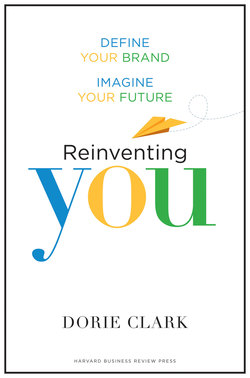Читать книгу Reinventing You - Dorie Clark - Страница 13
На сайте Литреса книга снята с продажи.
Tapping Your Network
ОглавлениеNext, identify the people you’ll be reaching out to. Whereas a coach who has been hired to interview people about you has license to talk to people in your organization, you need to be more careful if you’re doing your own assessment (plus, you don’t want to tip your hand if you’re considering a move away from your current employer). Focus on friends, colleagues, and family members who know you well and whom you can trust to give you honest feedback (no frenemies need apply). Phyllis Stein, the former director of Radcliffe College Career Services at Harvard University, suggests identifying up to twenty people who exemplify the interests, skills, and values you admire—preferably a geographically diverse assortment of men and women in different fields—to get the broadest perspective possible.
Now, it’s time to make the approach. Melcher suggests making it clear that you want to set aside time for an interview, not just regular friendly chitchat. “If you tell your friend you’re interviewing them, they take it much more seriously and will give you different answers,” he says. “You have to signal to people why you’re having the conversation: ‘I’m going to spend the next twenty minutes asking you about my brand, because I’d really like to see how I’m perceived.’”
Face-to-face interviews often yield better answers because you can follow up in real time if something isn’t clear or if you’d like to probe an answer further, but they don’t always work. Sometimes, geography intervenes—you’re in Miami and the interviewee is in Mumbai. Sometimes, your respondent is just too busy, and the best you’re going to get is an e-mail pecked out on a smartphone in between layovers. And sometimes—let’s be honest—you can’t handle the feedback. It’s easy enough to tamp your down emotions if you’re reading an e-mail; you can just snap the screen shut, take a long walk, and calm down if you see something you weren’t expecting. But in real time, it can be harder to hide your emotions. Sometimes the truth can be painful, and if your poker face isn’t up to snuff, you may want to stick to electronic communication.
The secret, whether you’re meeting in person or sending an e-mail request, is to stress the need for honesty (otherwise, what’s the point?). New York–based coach Alisa Cohn says you almost have to be forceful because friends’ desire to protect you is often so strong: “Say, ‘I’m trying to develop myself, and I know you love me, and I’d appreciate your candid feedback about my limitations.’ And they’ll say, ‘You don’t have any,’ and you say, ‘No, I’m serious.’ You have to get them to take it seriously. You have to cajole them into it.”
One trick, she says, is to provide them with leads, so they’re not the one bringing up something negative: “You can say, ‘I’ve gotten feedback in the past that I’m a tactical, not a strategic thinker. I’m wondering if you’ve seen that and what you think.’ When you rat yourself out first, they can add on.”
